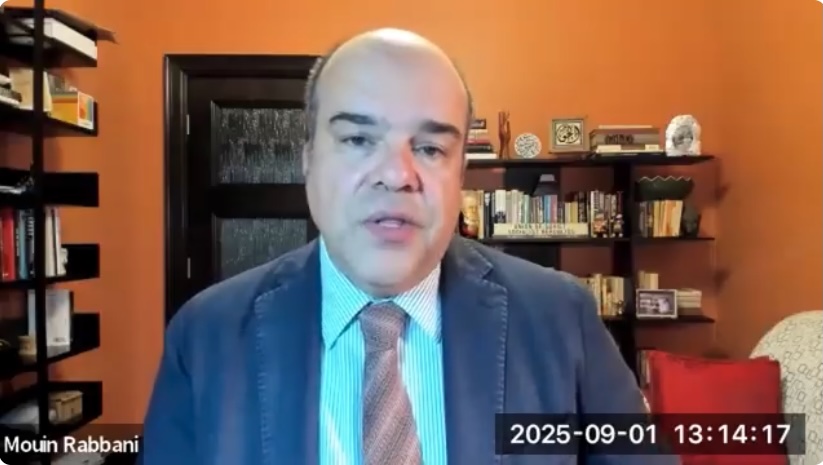Recently, I saw an excellent, hour-long interview with the super-smart Palestinian scholar Mouin Rabbani that was conducted by Abdel Abdelrahman, who runs the “Uncharted Territory” podcast. Mouin made a lot of great and timely points in the podcast, and it reminded me to go back to the conversation I conducted with him two months ago, that covered much of the same territory but from a slightly different angle. (Mouin, you will recall, was one of the five experts on the Hamas movement whom we featured in Just World Ed’s “Understanding Hamas” project last year.)
I think both conversations have great educational value, so I made transcripts of them both that you can download in PDF form here (my Sept. 1 convo) and here (Abdelhalim’s more recent one.)
You can find an excellent summary of my earlier convo with Mouin, here. (I’m sorry I didn’t have the time to make the transcript at that point. But you have it now.)
In that conversation, the imminent opening of the 80th session of the UN’s General Assembly loomed pretty large. Mouin and I also dove pretty deep into the histories of Fateh (as I had recounted it in my 1984 book The Palestinian Liberation Organisation), Hamas, and other Palestinian movements; and also the relationships among those movements, and of each of them with the PLO and its (very questionable) offshoot, the Palestinian Interim Self-Governing Authority.
Here were three key quotes that Mouin delivered in our convo:
- “So long as Mahmoud Abbas remains on the scene, there can be no reconciliation between these two movements [Fateh and Hamas] because he will always act to sabotage it”.
- “Recognition [of a Palestinian State] is symbolically important, but it is also practically meaningless if these states do absolutely nothing to make it meaningful”.
- “We’re really talking about the future of the Palestinian national movement as a whole. Will it survive in the form that we have known it in the past two decades? Or are we talking essentially about movements that will continue to exist at best as skeletons, as living corpses, while new forms of Palestinian mobilization, new and different forms emerge?”
Here is a (somewhat AI-generated) summary of the content of Abdelhalim’s more recent convo with Mouin:
Mouin Rabbani analyzed the ongoing crisis and political landscape in Palestine, especially in Gaza and the West Bank. Discussing the recent resumption of Israeli bombing, he noted there never was a true ceasefire, only fluctuating levels of violence, with Israel maneuvering around agreements under US pressure. He delved into the “West Bankification” of Gaza, where Israeli plans increasingly mirror its strategies in the West Bank: fragmenting territory, obstructing reconstruction, and impeding daily life to induce forced migration. He did note, however, that in general over the past 20 years, the Gaza Strip suffered far less internal physical fragmentation than the West Bank.
He stressed the impracticality of expecting armed Palestinian groups to disarm while occupation continues, the futility of “collaborating” with the occupation, and the failures of the Palestinian Authority to protect West Bank residents.
Rabbani highlighted the significance of rebuilding inclusive national institutions and argued that the focus should be less on individuals (like Marwan Barghouti) , and more on the development of collective strategies.
He noted a dramatic shift in Western—particularly American and British—public opinion and political climate on Palestine since 2024, crediting grassroots advocacy. But he emphasized that true liberation could be achieved only by Palestinians themselves. For Palestinians in diaspora, he urged information-sharing and solidifying Palestine in global consciousness over short-term political tactics.
To be honest, I don’t think that AI bot came close to being able to present the richness of Abdelhalim’s conversation with Mouin. It did, however, succeed in identifying these three key quotes from Mouin:
- “You can’t remove an occupation by collaborating with it. When you collaborate with an occupation, you deepen it. It’s always been the case everywhere. And I’ve seen no evidence that the case of Palestine is any different”.
- “What gives me hope is seeing some of these politicians, who you know are Israel flunkies … now getting up in public and saying, ‘I will no longer accept a penny from AIPAC.’ … When you have those kinds of people distancing themselves from Israel in public and doing so insincerely, because they feel they have to do that to survive—that’s what gives me hope”.
- “The key issue is to make sure that Palestine becomes an issue in every nook and cranny around the world, so that it solidifies in the global collective consciousness”.
As you’re probably aware, almost everyone these days who seeks to be a “public intellectual” has an account on Substack. Here is Abdelhalim‘s, and here is Mouin‘s. Do please subscribe to both of them– and also to Abdelhalim’s podcast on Youtube, here.
And just before we leave the Church of Mouin Rabbani, I’d like to note the excellence of the regular contributions he makes to Middle East Monitor, which you can access here.

